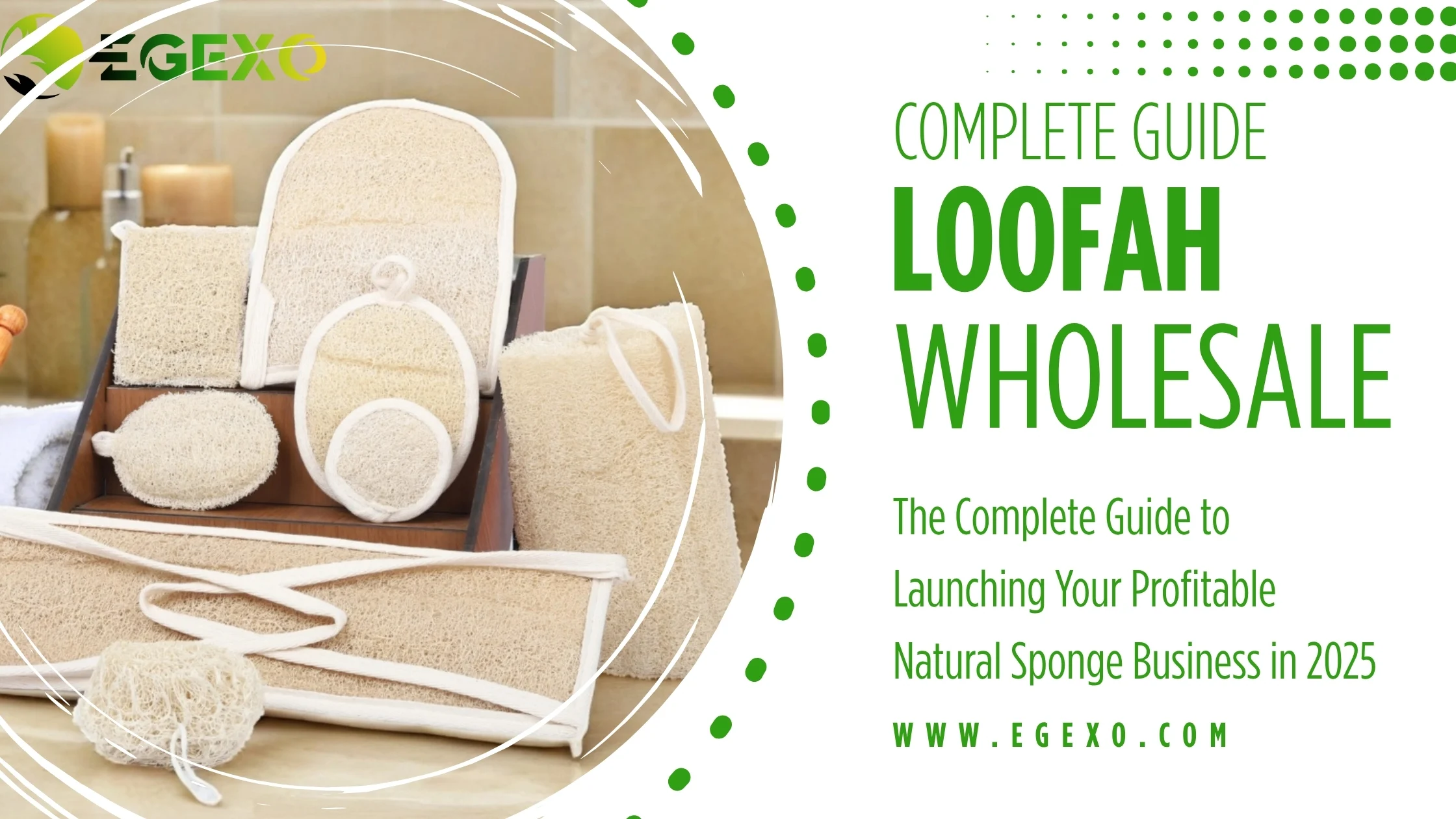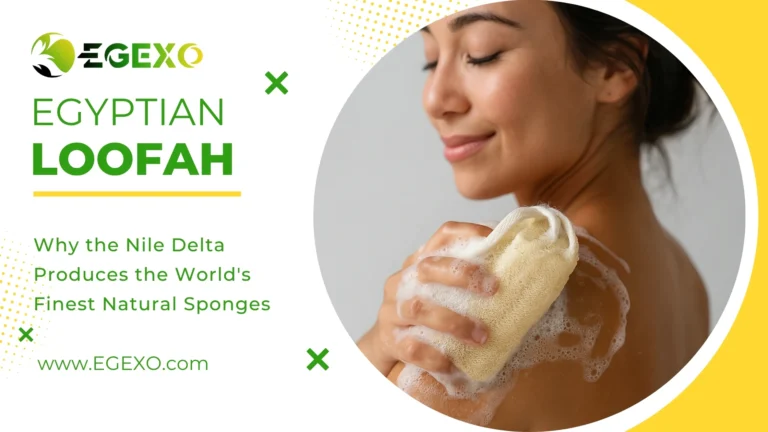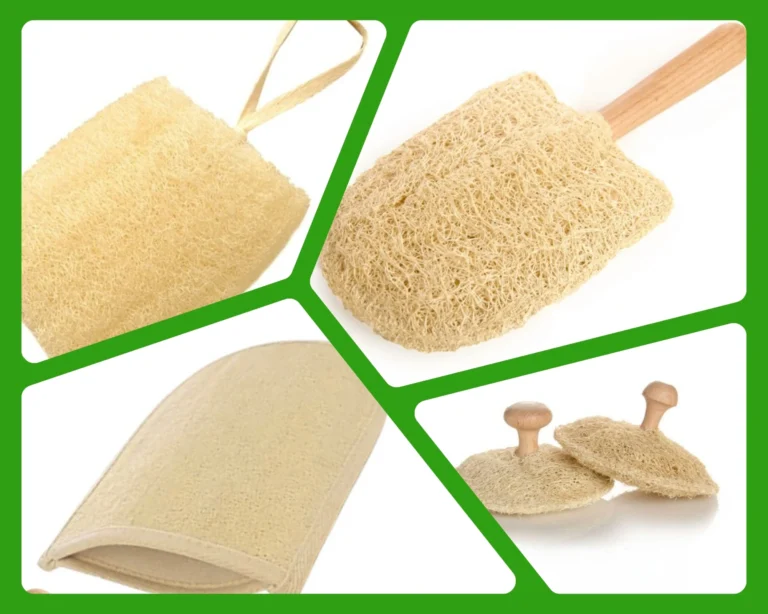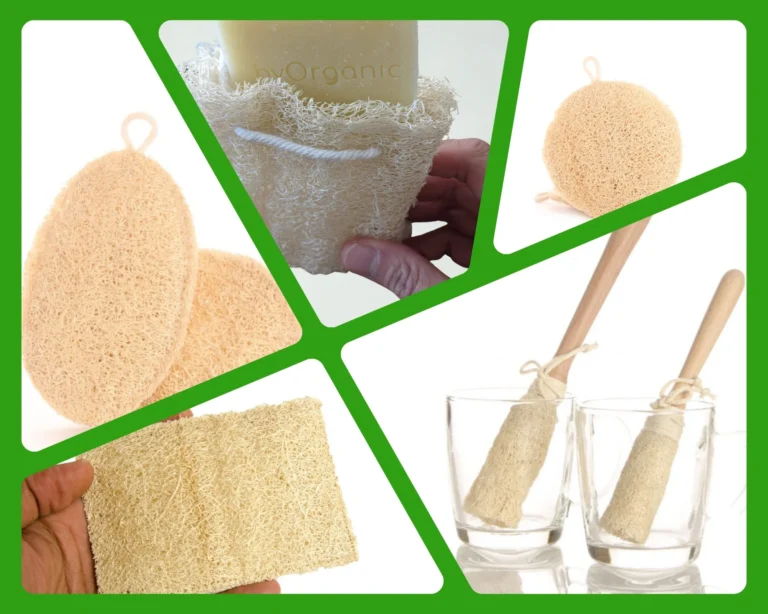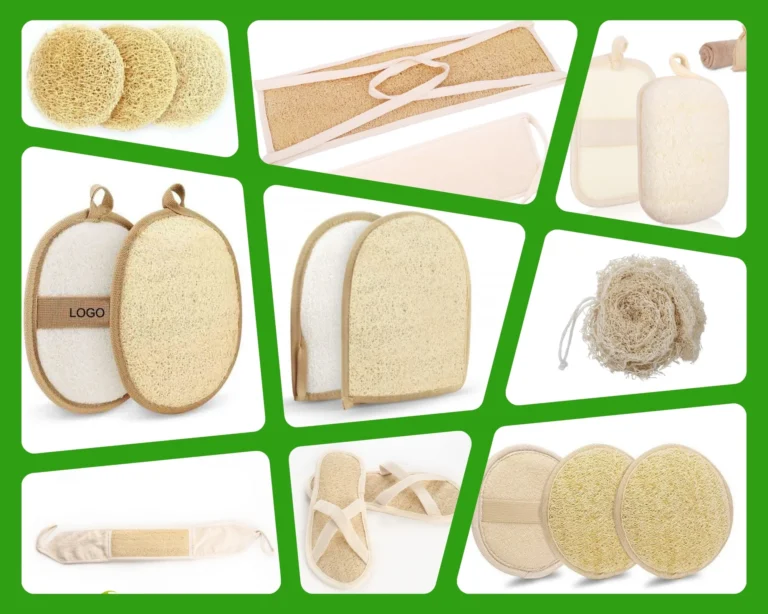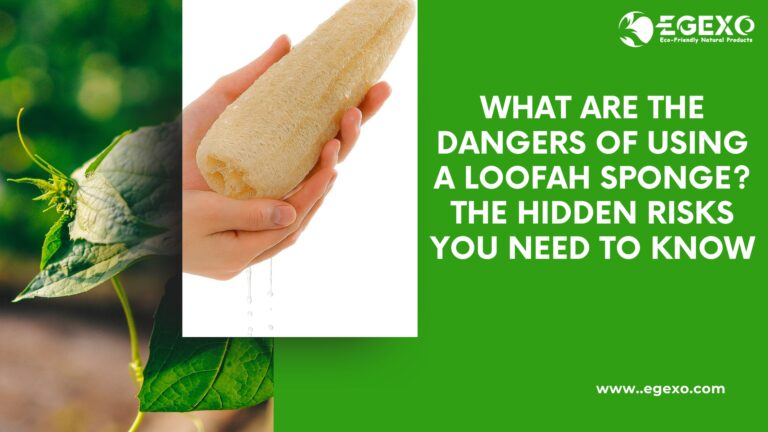Loofah Wholesale: The Complete Guide to Launching Your Profitable Natural Sponge Business in 2025
The shift toward sustainable living has created an unprecedented opportunity in the natural products market. As plastic pollution dominates global conversations and consumers actively seek eco-friendly alternatives, the loofah wholesale industry stands at a remarkable inflection point. Whether you’re a retailer exploring new product lines, a distributor seeking profitable opportunities, or an entrepreneur ready to launch your first venture, understanding the natural loofah market can position you for substantial success.
This comprehensive guide walks you through everything you need to know about building a thriving loofah business, from sourcing premium Egyptian loofah to understanding market dynamics across different continents. By the end, you’ll have actionable insights that can transform your business aspirations into reality.
Why Natural Loofah Represents the Best Choice for Your Business
Let me share something that happened at a trade show in Los Angeles last year. A small boutique owner from Portland approached our booth, frustrated with synthetic sponge returns from customers complaining about microplastic concerns and poor durability. She switched to natural loofah sponges and reported a 340% increase in her bath and body category within six months. Her story isn’t unique.
Natural loofah delivers benefits that synthetic alternatives simply cannot match. The plant-based luffa sponge grows from the Luffa aegyptiaca gourd, creating a fibrous network that becomes increasingly valuable as environmental awareness grows. Unlike plastic sponges that shed microparticles into waterways with every use, natural loofah biodegrades completely within 30 days of disposal.
The texture of an authentic loofah sponge provides gentle exfoliation that removes dead skin cells without causing irritation. This characteristic makes it ideal for sensitive skin markets, which represent a growing demographic willing to pay premium prices for quality products. When sourced from reputable suppliers, natural loofah maintains its structure through months of daily use, creating customer loyalty that drives repeat purchases.
What Makes Egyptian Loofah Superior in the Wholesale Market?
Geography matters more than most wholesale buyers initially realize. The Nile Delta region produces loofah with fiber density that sets global quality standards. Egyptian farmers have perfected cultivation techniques over generations, understanding precisely when to harvest for optimal fiber development. This expertise translates into products that outperform loofahs grown in other regions by significant margins.
The climate in Egypt’s loofah-growing regions creates ideal stress conditions for the plants. Hot days followed by cooler nights trigger natural defense mechanisms that strengthen fiber walls. This process results in sponges with superior water absorption capacity and faster drying times, two characteristics that directly impact bacterial resistance and product longevity.
Working with a dedicated Egyptian loofah supplier who controls the entire production process ensures consistency across orders. From cultivation through processing and export, maintaining quality standards at each stage protects your brand reputation and minimizes customer complaints.
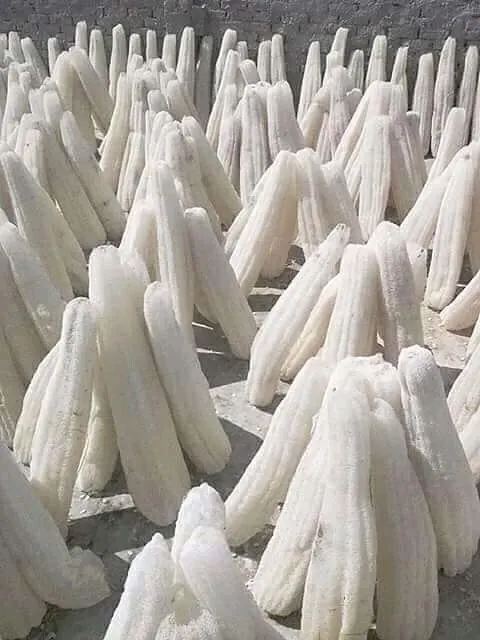
How Do You Identify the Right Loofah Supplier for Your Business?
Finding trustworthy partners in international trade requires due diligence that goes beyond price comparisons. Start by examining a supplier’s farm to export process. Transparent operations indicate professionalism and reduce the risk of quality issues that can damage your business.
Request detailed information about cultivation practices. Organic farming methods appeal strongly to health-conscious consumers and command premium pricing in retail markets. Ask about pesticide use, irrigation methods, and soil management practices. Suppliers who readily provide this information demonstrate the transparency modern consumers demand.
Processing standards directly impact product performance. Quality suppliers clean loofahs through multiple stages, removing seeds, plant material, and field debris. This attention to detail prevents the musty odors and rapid degradation that plague poorly processed products. Before committing to large orders, always request samples to evaluate texture, cleanliness, and overall quality firsthand.
Look for suppliers who maintain documented quality standards and hold relevant certifications. These credentials protect your business from regulatory complications while providing marketing advantages in increasingly conscious consumer markets.
What Product Categories Offer the Highest Profit Potential?
The versatility of natural loofah creates multiple revenue streams that smart wholesalers leverage simultaneously. The traditional bath and body segment remains strong, with consistent demand from spas, hotels, and retail stores. However, diversifying across categories stabilizes cash flow and protects against seasonal fluctuations.
Kitchen applications represent explosive growth opportunities. Restaurants increasingly seek natural alternatives to synthetic scrubbers that shed microplastics into food preparation areas. Kitchen loofah products excel at removing baked-on food without scratching non-stick surfaces, creating value propositions that justify premium pricing. Home cooks who prioritize sustainability represent another lucrative segment willing to pay more for eco-friendly cleaning solutions.
The pet grooming market offers particularly attractive margins. Professional groomers and pet owners discover that loofah pet grooming products provide gentle yet effective cleaning while massaging skin and promoting circulation. Pet owners consistently rank among the most willing consumers to invest in natural, safe products, making this segment ideal for premium positioning.
Raw, uncut loofah scrubbers appeal to craft enthusiasts and DIY markets. These customers appreciate the ability to customize size and shape for specific applications. Though smaller than other segments, this niche typically accepts higher per-unit pricing due to the specialized nature of the products.
How Can You Differentiate Your Loofah Business in Competitive Markets?
Commodity thinking kills profit margins. Successful loofah wholesalers recognize that positioning strategy matters as much as product quality. Private labeling services offer the fastest path to brand differentiation without manufacturing complexity. This approach allows you to focus on marketing and customer relationships while experienced manufacturers handle production logistics.
Consider how your brand story connects with target customers. A retailer in Vancouver built her entire loofah line around zero-waste living, packaging products in compostable materials and emphasizing the complete lifecycle sustainability. Her premium pricing strategy succeeded because the brand narrative aligned perfectly with customer values.
Custom product design capabilities allow you to create unique offerings that competitors cannot easily replicate. Perhaps your market wants loofahs infused with essential oils, or pre-shaped products for specific applications. Innovation in a traditional product category creates attention and justifies price premiums.
Education-based marketing establishes authority and builds trust. Create content explaining the environmental impact of synthetic sponges versus natural alternatives. Share information about Egyptian farming practices and the social impact of ethical sourcing. Customers increasingly make purchasing decisions based on values alignment, making transparent storytelling a powerful competitive advantage.
What Are the Regional Market Differences You Need to Understand?
North American markets, particularly the USA and Canada, prioritize convenience and clear value communication. These customers respond well to multi-pack offerings that emphasize cost savings. Packaging should include detailed usage instructions and care tips, as many consumers encounter natural loofah for the first time through retail purchases.
A distributor in Toronto shared that his breakthrough came when he started offering educational displays with product samples. Allowing customers to touch and feel the texture before purchasing increased conversion rates by over 60%. North American consumers also show strong preference for individually wrapped products that appear hygienic and ready for gifting.
European Union markets demand extensive documentation about sustainability and ethical sourcing. German retailers particularly request detailed information about cultivation practices and worker conditions. These markets support premium pricing when suppliers provide comprehensive transparency about production methods. The EU also maintains strict import regulations, so working with suppliers experienced in European compliance saves considerable headaches.
Australian and New Zealand markets share European values regarding sustainability but with added emphasis on natural, unbleached products. These consumers actively avoid cosmetic processing that compromises environmental credentials. Marketing messages emphasizing minimal processing and natural coloration resonate strongly in these regions.
Brazilian and Latin American markets show accelerating growth as middle-class expansion drives increased spending on personal care products. Cultural bathing traditions in these regions create natural affinity for exfoliating sponges. Local distributors report strong preference for larger format loofahs that can be cut and customized for family use.
How Do You Calculate Realistic Profit Margins in Loofah Wholesale?
Understanding cost structures allows accurate pricing that protects profitability while remaining competitive. Direct importing from Egyptian suppliers typically offers FOB pricing ranging from $0.50 to $3.00 per unit depending on size, processing level, and order volume. Shipping costs vary significantly by destination and order size, generally adding $0.30 to $1.00 per unit for container shipments.
Customs duties and import taxes depend on your country’s trade agreements and product classification. The USA maintains relatively low tariffs on natural loofah imports, while some European countries impose higher rates. Factor these costs accurately in your pricing calculations to avoid margin erosion.
Retail markets typically support 100% to 300% markups over wholesale cost, depending on positioning and market conditions. Premium natural products often command the higher end of this range, especially when marketed with strong brand stories and values alignment. Wholesale to retailers generally works on 50% to 100% markups, balancing volume with profitability.
A successful strategy involves tiered pricing based on order volumes. Offer attractive per-unit costs for large orders while maintaining higher margins on smaller purchases. This approach encourages order size growth while protecting profitability across your customer base.
What Logistics Considerations Impact Your Loofah Wholesale Business?
Storage requirements for natural loofah differ significantly from synthetic alternatives. These products require dry, well-ventilated spaces to maintain quality and prevent mold growth. A distributor in Miami learned this lesson expensively when a shipment stored in a humid warehouse developed mildew that rendered the entire inventory unsaleable.
Temperature control matters less than moisture management. Proper air circulation prevents the damp conditions where problems develop. If operating in humid climates, invest in dehumidification equipment or climate-controlled storage. This upfront cost protects inventory value and prevents costly quality issues.
Packaging affects both storage efficiency and product presentation. Compressed packaging reduces shipping costs and storage space requirements while protecting products during transit. However, retail-ready packaging that showcases the natural texture helps drive purchase decisions at point of sale. Balance these considerations based on your distribution model.
Lead times from Egyptian suppliers typically range from 4 to 8 weeks depending on order size and season. Plan inventory levels accordingly, maintaining buffer stock to prevent stockouts during peak demand periods. The fourth quarter typically sees increased demand as holiday gifting drives bath and body purchases.
Why Should You Consider Offering Value-Added Services?
Moving beyond simple product distribution creates competitive moats that protect your business. Educational content about proper loofah care extends product lifespan and customer satisfaction. Simple instructions about rinsing thoroughly after each use and allowing complete drying between uses dramatically improve the user experience.
Offering product bundles that pair loofahs with complementary items increases average transaction values. A spa supply wholesaler in California reports success bundling natural loofah with organic soaps and body oils, positioning the combination as a complete natural bathing experience. This strategy increased average order values by 45% while simplifying purchasing decisions for retailers.
Consultation services for new retailers add value that justifies premium pricing or exclusive relationships. Help customers understand display strategies, pricing approaches, and marketing messages that drive sales. This expertise becomes particularly valuable for retailers new to natural product categories.
Regular market insights about trends and consumer preferences position you as a strategic partner rather than a commodity supplier. Share information about emerging product preferences, successful marketing approaches, and competitive intelligence. These value additions create switching costs that protect customer relationships.
How Can You Start Small and Scale Your Loofah Business?
The beauty of the loofah wholesale market lies in accessible entry points. You don’t need massive capital to test market viability. Starting with a smaller initial order of 500 to 1,000 pieces allows you to validate demand without excessive risk. Total investment for this scale typically ranges from $1,500 to $4,000 including product, shipping, and initial marketing.
Focus initially on a single distribution channel to simplify operations and accelerate learning. Perhaps you start with online sales through your own e-commerce site, or focus on local retailers in your region. Master one channel before expanding to others, building systems and understanding that transfer to additional channels later.
The sample approach de-risks early-stage operations. Request samples from potential suppliers to evaluate quality before committing to large orders. Share these samples with potential retail customers to gauge interest and refine your product selection based on actual market feedback rather than assumptions.
As sales validate your business model, scale systematically. Increase order sizes to improve per-unit costs and expand your profit margins. Add complementary product categories that appeal to your existing customer base. A successful wholesaler in Seattle started with bath loofahs, added kitchen products after six months, then expanded into pet grooming a year later. This staged approach allowed sustainable growth without overextending resources.
What Role Does Product Quality Play in Long-Term Success?
Quality represents the foundation of sustainable wholesale businesses. A single batch of inferior products can damage relationships built over years. Retailers remember poor quality far longer than they appreciate good pricing, making quality assurance essential for longevity.
Establish inspection protocols for every shipment received. Check fiber density, cleanliness, and structural integrity across representative samples from each batch. Document your findings and address issues immediately with suppliers. Professional suppliers appreciate quality-focused customers because they protect the supplier’s reputation in the market.
Natural variation occurs in agricultural products, including loofah. Set reasonable quality tolerances while maintaining minimum acceptable standards. Perfect uniformity is unrealistic, but consistency in core performance characteristics like durability and cleanliness should be non-negotiable.
Customer feedback loops provide crucial quality intelligence. When retailers report issues, investigate thoroughly and respond proactively. Sometimes the problem stems from improper product use or storage by end consumers. Create educational materials that address common misunderstandings about natural loofah care and maintenance.
How Do Current Sustainability Trends Benefit Loofah Wholesalers?
The global movement away from single-use plastics creates tailwinds for natural loofah businesses. Governments worldwide implement regulations restricting plastic products, forcing retailers to seek alternatives. The European Union’s single-use plastics directive, implemented in 2021, accelerated demand for natural alternatives across member states.
Corporate sustainability commitments from major retailers create purchasing pressure for eco-friendly products. When large chains set goals to reduce plastic packaging and offer more sustainable products, they need suppliers who can deliver. Positioning yourself as a solution provider for these corporate initiatives opens doors to substantial contracts.
Consumer awareness about microplastic pollution drives purchasing decisions, particularly among younger demographics. Studies show microplastics from synthetic sponges enter water systems and ultimately the food chain. Natural loofah contains zero synthetic materials, making it truly biodegradable and ocean-safe. This characteristic becomes increasingly valuable as environmental consciousness grows.
The circular economy concept aligns perfectly with natural loofah products. After months of use, loofahs can be composted, returning nutrients to soil and completing a natural cycle. Forward-thinking brands leverage this narrative, creating marketing messages that resonate deeply with sustainability-focused consumers.
Frequently Asked Questions About Loofah Wholesale
What minimum order quantities should I expect from loofah suppliers?
Most professional loofah suppliers set minimum orders between 500 and 5,000 pieces depending on the product type and customization level. Standard products typically have lower minimums, while custom designs or private labeling require larger commitments. Starting with smaller orders allows you to test market response before scaling up.
How long does natural loofah last compared to synthetic sponges?
Quality natural loofah sponges typically last 3 to 6 months with proper care, significantly outlasting most synthetic alternatives. The key lies in proper maintenance such as rinsing thoroughly after each use and allowing complete drying between uses. This longevity creates better value for end consumers and reduces replacement frequency.
What profit margins can I realistically expect in the loofah wholesale business?
Wholesale margins typically range from 50% to 100% when selling to retailers, while direct-to-consumer sales can support 100% to 300% markups. Actual margins depend on your positioning, market conditions, and value-added services. Premium natural products generally command higher margins than commodity items.
Do I need special storage conditions for natural loofah inventory?
Natural loofah requires dry, well-ventilated storage to prevent mold and maintain quality. Unlike synthetic sponges, these products absorb moisture from humid environments, potentially leading to degradation. Invest in proper storage conditions, especially in humid climates, to protect inventory value.
How do I compete with established loofah wholesalers in my market?
Differentiation through branding, education, and service creates competitive advantages beyond price competition. Consider private labeling to build brand equity, offer superior customer service, and provide educational resources that position you as a trusted advisor. Focusing on underserved niches like pet grooming or kitchen applications can also reduce direct competition.
What certifications should I look for in a loofah supplier?
Seek suppliers with organic farming certifications, fair trade credentials, and export compliance documentation. These certifications indicate professional operations and provide marketing advantages with increasingly conscious consumers. They also reduce regulatory risks in import processes.
Can I start a loofah business with limited capital?
Yes, the loofah wholesale market offers accessible entry points. Starting with 500 to 1,000 pieces requires investment between $1,500 and $4,000 including product and shipping. Testing market demand before scaling reduces financial risk while allowing you to refine your approach based on real customer feedback.
How do I handle seasonal demand variations in the loofah business?
The fourth quarter typically sees increased demand due to holiday gifting and spa-related purchases. Plan inventory levels to maintain adequate stock during peak periods while avoiding excess inventory in slower months. Diversifying across product categories like kitchen and pet applications helps stabilize demand throughout the year.
What makes Egyptian loofah different from loofah grown in other regions?
Egyptian loofah benefits from ideal growing conditions in the Nile Delta, generations of cultivation expertise, and climate patterns that strengthen fiber structure. These factors result in superior density, durability, and water absorption compared to loofahs from other origins. The quality difference becomes apparent in product performance and longevity.
How can I verify the quality of loofah before placing large orders?
Always request samples before committing to significant orders. Evaluate fiber density by squeezing the dry sponge and assessing resistance. Check cleanliness by examining for seeds, plant debris, or discoloration. Test water absorption and drying time with actual use. Professional suppliers welcome quality-focused customers and readily provide samples for evaluation.
Taking Your Next Steps in the Loofah Wholesale Business
The opportunity in natural loofah wholesale grows stronger as environmental awareness transforms consumer behavior worldwide. Success requires more than simply sourcing products; it demands understanding market dynamics, building reliable supplier relationships, and creating value beyond commodity distribution.
Start by exploring the comprehensive product catalog to understand available options across different categories. Whether you focus on bath and body, kitchen applications, or pet grooming, each segment offers distinct opportunities with specific customer needs.
Consider your unique market position and competitive advantages. Perhaps your retail relationships provide immediate distribution channels, or maybe your marketing expertise can build a direct-to-consumer brand. The most successful loofah businesses leverage existing strengths while systematically developing new capabilities.
Connect with experienced suppliers who understand international trade complexities and maintain consistent quality standards. Review their quality standards and farm to export process to ensure alignment with your business requirements. Transparency in operations indicates professionalism and reduces the risks inherent in international sourcing.
The natural products revolution continues accelerating, driven by environmental necessity and changing consumer values. Positioning yourself in the loofah wholesale market today captures momentum from long-term trends that will shape retail for decades. Whether you’re an established distributor adding product lines or an entrepreneur launching your first venture, natural loofah offers a proven pathway to profitable, sustainable business growth.
Ready to explore how loofah wholesale can transform your business? Request a detailed quote or contact us directly to discuss your specific requirements and market opportunities. The natural sponge market waits for no one, and early movers capture the most attractive positions in rapidly growing categories.

